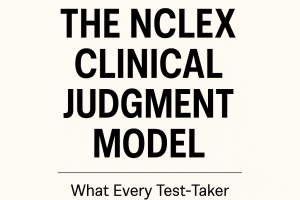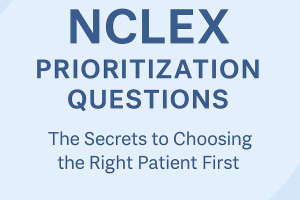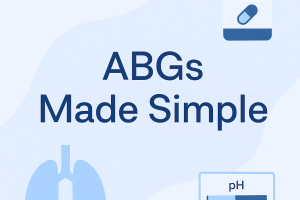NCLEX Study Groups: Are They Worth It or a Waste of Time?

Preparing for the NCLEX can feel overwhelming, and many test-takers consider joining a study group to help them stay on track. But are NCLEX study groups actually effective, or do they end up being a distraction?
In this article, we’ll break down the pros and cons of study groups, how to make them work for you, and whether they’re the right fit for your learning style.
The Benefits of NCLEX Study Groups
1. Active Learning and Knowledge Retention
Studying in a group allows you to actively engage with the material rather than passively reading or watching lectures. Explaining concepts to others helps reinforce your understanding and improves long-term retention.
2. Exposure to Different Study Strategies
Every nursing student has a unique way of breaking down difficult topics. In a study group, you can learn new memory tricks, mnemonics, and test-taking strategies that you might not have thought of on your own.
3. Accountability and Motivation
It’s easy to procrastinate when studying alone, but being part of a study group keeps you accountable. Knowing that others are relying on you to participate can push you to stay committed to your NCLEX prep.
4. Helps with Difficult Topics
Certain NCLEX topics, such as pharmacology, EKG interpretation, and priority-setting questions, can be challenging to tackle alone. A study group allows you to discuss tough concepts and hear different explanations that might make things click.
5. Builds Confidence for the Exam
Practicing NCLEX-style questions in a group setting simulates the pressure of the real exam. By answering questions out loud and justifying your choices, you build confidence in your test-taking abilities.
The Downsides of NCLEX Study Groups
1. Can Be Distracting
If the group lacks structure, sessions can turn into social gatherings rather than productive study time. It’s important to set clear goals and stay focused.
2. Different Learning Paces
Some group members may move too fast or too slow for your learning style. If you’re struggling to keep up or feel like you’re not being challenged enough, a study group may not be the best fit.
3. Risk of Misinformation
Not everyone in the group will have the correct answers or explanations. Without fact-checking against reliable sources, you might unknowingly learn incorrect information.
4. Time Management Issues
Coordinating schedules and finding a time that works for everyone can be difficult. If meetings are inconsistent or disorganized, they may not be worth the effort.
How to Make NCLEX Study Groups Work for You
If you decide to join or start a study group, follow these best practices to maximize productivity:
✅ Keep the group small (3-5 people). Too many participants can lead to chaos and distractions.
✅ Set a clear agenda. Plan what topics you’ll cover in each session and stick to the schedule.
✅ Use active learning techniques. Instead of just reading notes, try case studies, teaching each other, or doing NCLEX-style practice questions together.
✅ Fact-check answers. Use reliable NCLEX resources like the NCSBN, UWorld, or Saunders to confirm information.
✅ Rotate leadership. Assign one person to lead each session and keep the discussion on track.
✅ Use a mix of independent and group study. Balance study group sessions with solo review to reinforce your understanding.
Who Benefits Most from Study Groups?
✔ If you learn best by discussing and explaining concepts, a study group can be a great fit.
✔ If you struggle with motivation and need accountability, a group can help keep you on track.
✔ If you prefer structured study sessions with set goals, a study group can add value to your preparation.
On the other hand, if you find that group settings slow you down, lead to distractions, or don’t align with your learning style, it might be best to focus on self-study.
Final Verdict: Are NCLEX Study Groups Worth It?
It depends! When structured correctly, study groups can be a powerful tool for NCLEX success. However, if they lack organization or don’t match your learning needs, they may be more of a distraction than a benefit.






